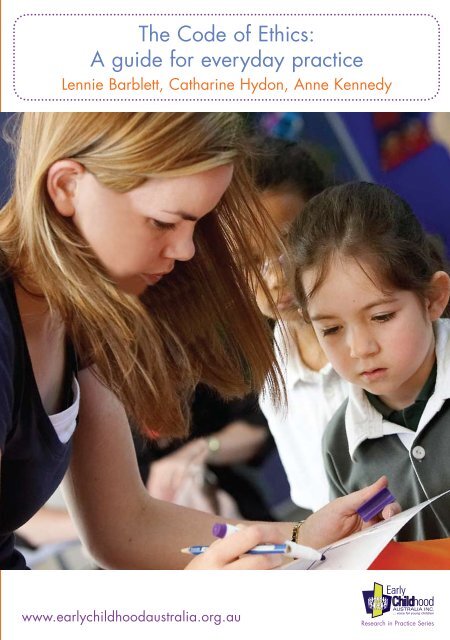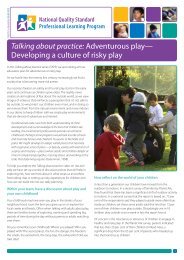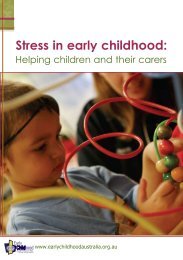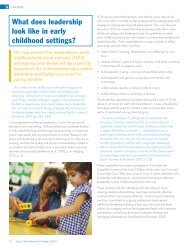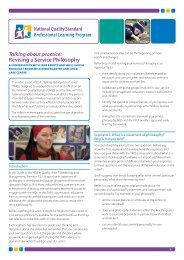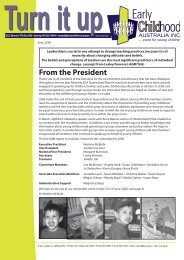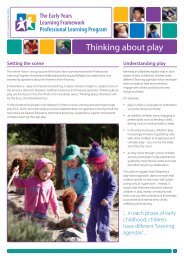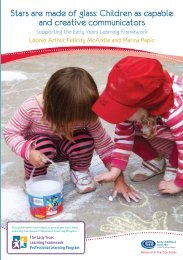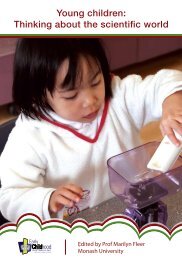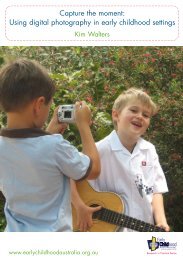The Code of Ethics - Early Childhood Australia
The Code of Ethics - Early Childhood Australia
The Code of Ethics - Early Childhood Australia
You also want an ePaper? Increase the reach of your titles
YUMPU automatically turns print PDFs into web optimized ePapers that Google loves.
<strong>The</strong> <strong>Code</strong> <strong>of</strong> <strong>Ethics</strong>:<br />
A guide for everyday practice<br />
Lennie Barblett, Catharine Hydon, Anne Kennedy<br />
www.earlychildhoodaustralia.org.au<br />
Research in Practice Series
About <strong>Early</strong> <strong>Childhood</strong> <strong>Australia</strong><br />
<strong>Early</strong> <strong>Childhood</strong> <strong>Australia</strong> actively<br />
promotes the provision <strong>of</strong> high-quality<br />
services for all young children from<br />
birth to eight years and their families,<br />
and supports the important role <strong>of</strong><br />
parents. <strong>Early</strong> <strong>Childhood</strong> <strong>Australia</strong> is also the<br />
national umbrella organisation for children’s<br />
services and a leading early childhood<br />
publisher.<br />
About the Series<br />
<strong>The</strong> Research in Practice Series is<br />
published four times each year by<br />
<strong>Early</strong> <strong>Childhood</strong> <strong>Australia</strong>.<br />
<strong>The</strong> series aims to provide practical,<br />
easy to read, up-to-date information<br />
and support to a growing national<br />
readership <strong>of</strong> early childhood workers.<br />
<strong>The</strong> books bring together the best<br />
information available on wide-ranging topics<br />
and are an ideal resource for children’s<br />
services workers and others interested in<br />
the care and education <strong>of</strong> young children.<br />
Series Editor Nick Craven<br />
Edition Editor Jenni Connor<br />
Graphic Design Marie Lake<br />
Photographs Andrew Sikorski<br />
Thanks to <strong>Early</strong> <strong>Childhood</strong> <strong>Australia</strong><br />
Tasmania Branch for their contribution<br />
to the production <strong>of</strong> this book.<br />
Invitation to authors<br />
If you are interested in writing for the<br />
Research in Practice Series or any other<br />
<strong>Early</strong> <strong>Childhood</strong> <strong>Australia</strong> publication,<br />
please contact the Publications Section<br />
for further information on the preparation<br />
<strong>of</strong> manuscripts and for a copy <strong>of</strong> the<br />
guidelines for contributors.<br />
Membership, publishing<br />
and general enquiries<br />
<strong>Early</strong> <strong>Childhood</strong> <strong>Australia</strong> Inc.<br />
PO Box 7105 Watson ACT 2602<br />
T: (02) 6242 1800<br />
F: (02) 6242 1818<br />
Sales line: 1800 356 900 (freecall)<br />
E: eca@earlychildhood.org.au<br />
publishing@earlychildhood.org.au<br />
© Copyright 2008<br />
All rights reserved by<br />
<strong>Early</strong> <strong>Childhood</strong> <strong>Australia</strong> Inc.<br />
Material herein must not be reproduced<br />
in any form without the written permission<br />
<strong>of</strong> <strong>Early</strong> <strong>Childhood</strong> <strong>Australia</strong> Inc.<br />
Registered for posting as a publication—<br />
PP232100/00036<br />
ISSN 1440-5148<br />
ISBN10 1-921 162-21-X<br />
ISBN13 978-1-921162-21-3<br />
Printed by Goanna, Canberra
ii About the authors<br />
1<br />
2<br />
3<br />
4<br />
7<br />
9<br />
10<br />
24<br />
25<br />
26<br />
Introduction<br />
Contents<br />
What is the ECA <strong>Code</strong> <strong>of</strong> <strong>Ethics</strong>?<br />
<strong>The</strong> importance <strong>of</strong> the <strong>Code</strong> <strong>of</strong> <strong>Ethics</strong><br />
Values in the <strong>Code</strong> <strong>of</strong> <strong>Ethics</strong><br />
What are ethical dilemmas or challenges?<br />
Process for using the <strong>Code</strong> <strong>of</strong> <strong>Ethics</strong><br />
Ethical commitments in the <strong>Code</strong> <strong>of</strong> <strong>Ethics</strong><br />
Building ethical practice and awareness using the <strong>Code</strong> <strong>of</strong> <strong>Ethics</strong><br />
Conclusion<br />
References and further reading<br />
<strong>The</strong> <strong>Code</strong> <strong>of</strong> <strong>Ethics</strong>: A guide for everyday practice<br />
i
ii<br />
Lennie Barblett<br />
Research in Practice Series Volume 15 Number 1 2008<br />
About the authors<br />
Qualifications: Dip Tch (<strong>Early</strong> <strong>Childhood</strong>); BEd (Hons); PhD.<br />
Lennie worked as an early childhood teacher for 15 years in a number <strong>of</strong> diverse<br />
early childhood settings in rural, remote and metropolitan areas. Following this,<br />
she furthered her studies and is now a senior lecturer in the School <strong>of</strong> Education<br />
at Edith Cowan University. She is a keen researcher and works on a number <strong>of</strong><br />
committees to further her advocacy work for young children. Lennie has been<br />
a longtime member <strong>of</strong> <strong>Early</strong> <strong>Childhood</strong> <strong>Australia</strong>, and has served on the National<br />
Executive Committee and recently as the Western <strong>Australia</strong>n State President.<br />
Catharine Hydon<br />
Qualifications: Dip Tch (<strong>Early</strong> <strong>Childhood</strong>); MEd (<strong>Early</strong> <strong>Childhood</strong>).<br />
Beginning as a kindergarten teacher, Catharine has managed a long day childcare<br />
centre in Melbourne, taught in a school-based program in Papua New Guinea and<br />
worked in a support and training role at the FKA Multicultural Resource Centre.<br />
She has been a longtime member <strong>of</strong> <strong>Early</strong> <strong>Childhood</strong> <strong>Australia</strong>, and co-founded Real<br />
Rights for Refugee Children. In 2003, Catharine was awarded the Barbara Creaser<br />
Memorial Award for outstanding contribution to early childhood education.<br />
She is the Victorian representative on the National Board <strong>of</strong> <strong>Early</strong> <strong>Childhood</strong><br />
<strong>Australia</strong> and is currently the <strong>Early</strong> Years Strategy Project Manager for <strong>The</strong><br />
Brotherhood <strong>of</strong> St Laurence.<br />
Anne Kennedy<br />
Qualifications: TITC; Dip Tch (<strong>Early</strong> <strong>Childhood</strong>); BEd (<strong>Early</strong> <strong>Childhood</strong>); MEd; EdD.<br />
<strong>The</strong> ethics <strong>of</strong> early childhood education was the focus for Anne’s doctoral research.<br />
She has recently retired from Monash University, where she worked in the Faculty<br />
<strong>of</strong> Education for 15 years. She has also worked in teacher education programs in<br />
the USA, Singapore and Sweden. In her current positions as the Chairperson for<br />
Community Child Care Association in Victoria and Vice President <strong>of</strong> FKA Children’s<br />
Services, Anne is actively engaged in advocacy work for children and families.<br />
Lennie, Catharine and Anne were members <strong>of</strong> the <strong>Early</strong> <strong>Childhood</strong> <strong>Australia</strong><br />
<strong>Code</strong> <strong>of</strong> <strong>Ethics</strong> national working party for the revised <strong>Code</strong>.
<strong>The</strong> purpose <strong>of</strong> this book<br />
Introduction<br />
This publication is written as a companion document to <strong>Early</strong> <strong>Childhood</strong> <strong>Australia</strong>’s<br />
<strong>Code</strong> <strong>of</strong> <strong>Ethics</strong> (2006). It is a resource designed to assist early childhood<br />
pr<strong>of</strong>essionals when using the <strong>Code</strong> for discussing and reflecting on ethical issues<br />
with colleagues, or for making their own ethical decisions.<br />
<strong>The</strong> structure <strong>of</strong> this book<br />
This book assists in the exploration <strong>of</strong> the <strong>Code</strong> <strong>of</strong> <strong>Ethics</strong> and how it can be used<br />
to support critical thinking and ethical decision making. <strong>The</strong> importance <strong>of</strong> the<br />
<strong>Code</strong>, the contexts in which it can be used, and its embedded values are featured.<br />
<strong>The</strong> book also describes how early childhood pr<strong>of</strong>essionals can build ethical<br />
practices and awareness using the <strong>Code</strong>.<br />
Ethical dilemmas or challenges are defined and each section <strong>of</strong> the <strong>Code</strong><br />
is presented with an ethical exploration activity. Each ethical exploration has<br />
three aspects:<br />
◆ ‘Thinking’ – to be used as an initial point to reflect on values, beliefs and<br />
practices before discussion.<br />
◆ ‘Talking’ – where the questions can be used to stimulate discussion amongst<br />
colleagues or to raise questions for personal reflection.<br />
◆ ‘Action’ – where the knowledge or insights gained through reflection and<br />
discussion can be applied to everyday ethical challenges or issues.<br />
<strong>The</strong> <strong>Code</strong> <strong>of</strong> <strong>Ethics</strong>: A guide for everyday practice<br />
1
2<br />
What is the<br />
ECA <strong>Code</strong> <strong>of</strong> <strong>Ethics</strong>?<br />
<strong>Early</strong> <strong>Childhood</strong> <strong>Australia</strong>’s <strong>Code</strong> <strong>of</strong> <strong>Ethics</strong> (2006) provides a framework for<br />
thinking about the ethical issues early childhood pr<strong>of</strong>essionals encounter in their<br />
everyday work.<br />
Rather than being a set <strong>of</strong> rules to follow, the <strong>Code</strong> is an aspirational document which<br />
provides an ethical compass—a ‘resource for the journey’ (Mackay, 2004, p. 14).<br />
Committing to or using the <strong>Code</strong> is about being willing to recognise the<br />
complexities inherent in our work and the need to think carefully before acting.<br />
<strong>The</strong> <strong>Code</strong> is made up <strong>of</strong> eight sections which identify commitments to:<br />
◆<br />
◆<br />
◆<br />
◆<br />
children<br />
families<br />
colleagues<br />
communities<br />
Contexts for the ECA <strong>Code</strong> <strong>of</strong> <strong>Ethics</strong><br />
<strong>Early</strong> <strong>Childhood</strong> <strong>Australia</strong> (ECA) adopted a <strong>Code</strong> <strong>of</strong> <strong>Ethics</strong> for the pr<strong>of</strong>ession in<br />
1990. <strong>Code</strong>s <strong>of</strong> ethics have been described as a guide to moral practice, a set <strong>of</strong><br />
principles from which to understand our actions and relationships. This means that<br />
codes need to be revised regularly in order to reflect contemporary contexts.<br />
<strong>The</strong> second edition <strong>of</strong> the ECA <strong>Code</strong> <strong>of</strong> <strong>Ethics</strong> was developed through a process<br />
<strong>of</strong> national consultation. <strong>The</strong> revised <strong>Code</strong> incorporates new research and reflects<br />
changes in the early childhood knowledge base. For example, the revised <strong>Code</strong><br />
regards children as global citizens with the right to participate in the negotiation <strong>of</strong><br />
their learning and social experiences. It also recognises that globalisation impacts<br />
on all <strong>Australia</strong>n families and communities, and changes the nature <strong>of</strong> the work <strong>of</strong><br />
early childhood pr<strong>of</strong>essionals.<br />
Research in Practice Series Volume 15 Number 1 2008<br />
◆<br />
◆<br />
◆<br />
◆<br />
students<br />
employers<br />
myself as a pr<strong>of</strong>essional<br />
the conduct <strong>of</strong> research.<br />
<strong>Early</strong> <strong>Childhood</strong> <strong>Australia</strong>’s <strong>Code</strong> <strong>of</strong> <strong>Ethics</strong> is available on the <strong>Early</strong> <strong>Childhood</strong> <strong>Australia</strong><br />
website: www.earlychildhoodaustralia.org.au/code<br />
Alternatively, you can order copies <strong>of</strong> the <strong>Code</strong> <strong>of</strong> <strong>Ethics</strong> brochure and poster (A1 size)<br />
through www.earlychildhoodaustralia.org.au/shop or freecall 1800 356 900.
<strong>The</strong> importance <strong>of</strong> the<br />
<strong>Code</strong> <strong>of</strong> <strong>Ethics</strong><br />
<strong>The</strong> <strong>Code</strong> challenges pr<strong>of</strong>essionals to take action<br />
in the face <strong>of</strong> practices that undermine the wellbeing<br />
<strong>of</strong> children and their families, and provides a platform<br />
for ongoing advocacy.<br />
<strong>The</strong> <strong>Code</strong> is important because it is:<br />
◆<br />
Symbolic<br />
<strong>The</strong> <strong>Code</strong> is an aspirational document symbolising<br />
pr<strong>of</strong>essional commitments and ethical<br />
responsibilities, the pr<strong>of</strong>ession’s history and<br />
current obligations.<br />
◆ A way <strong>of</strong> looking<br />
<strong>The</strong> <strong>Code</strong>’s principles provide a lens through<br />
which early childhood pr<strong>of</strong>essionals can recognise<br />
or reconsider how children, families and communities<br />
have rights, entitlements and strengths. This<br />
ethical lens highlights complex issues including<br />
environmental sustainability, globalisation and<br />
technology. <strong>The</strong> <strong>Code</strong> reminds us that these issues<br />
impact on children and their families, which means<br />
that early childhood pr<strong>of</strong>essionals must respond<br />
in their everyday practice.<br />
◆ A tool for advocacy<br />
<strong>The</strong> <strong>Code</strong>’s principles support advocacy on behalf<br />
<strong>of</strong> or with children, families, communities and the<br />
pr<strong>of</strong>ession. <strong>Early</strong> childhood pr<strong>of</strong>essionals must take<br />
an ethical stance for the rights <strong>of</strong> children, including<br />
the right to play and freedom for self-expression<br />
as enshrined in the United Nation’s <strong>The</strong> convention<br />
on the rights <strong>of</strong> the child (1989) and in principle I.2<br />
<strong>of</strong> the <strong>Code</strong>.<br />
<strong>The</strong> <strong>Code</strong> <strong>of</strong> <strong>Ethics</strong>: A guide for everyday practice<br />
3
4<br />
◆<br />
A way <strong>of</strong> uniting the sector<br />
<strong>The</strong> <strong>Code</strong> can help to unite the early childhood sector by providing a common<br />
language and shared values connected to working with children and their<br />
families.<br />
◆ A framework for reflective practice<br />
<strong>The</strong> <strong>Code</strong> can provide a context for reflection which helps to avoid ‘group think’<br />
behaviour (e.g. ’we always do it that way’) or a lack <strong>of</strong> individual responsibility<br />
(e.g. ‘I was just doing my job’).<br />
◆<br />
A guide for decision making<br />
<strong>The</strong> <strong>Code</strong> signposts ethical principles to guide pr<strong>of</strong>essional decision making.<br />
◆ A call to action<br />
<strong>The</strong> <strong>Code</strong> is a call to act in the face <strong>of</strong> unethical practices or policies, as the<br />
preamble states: ‘In this <strong>Code</strong> <strong>of</strong> <strong>Ethics</strong> the protection and wellbeing <strong>of</strong> children<br />
is paramount and therefore speaking out or taking action in the presence <strong>of</strong><br />
unethical practice is an essential pr<strong>of</strong>essional responsibility.’<br />
Values in the <strong>Code</strong> <strong>of</strong> <strong>Ethics</strong><br />
Each principle or commitment in the <strong>Code</strong> reflects or is based on a value position.<br />
Values are deeply-held beliefs which commit people to action, or underpin their<br />
responses to issues. Acting on value commitments requires personal qualities such<br />
as courage, honesty and perseverance.<br />
<strong>The</strong> processes, values and qualities which underpin the <strong>Code</strong> are identified in the<br />
document as:<br />
◆<br />
◆<br />
◆<br />
◆<br />
◆<br />
respect<br />
democracy<br />
honesty<br />
integrity<br />
justice<br />
Adopting the <strong>Code</strong> means honouring these values, qualities and processes.<br />
Research in Practice Series Volume 15 Number 1 2008<br />
◆<br />
◆<br />
◆<br />
◆<br />
courage<br />
inclusivity<br />
social and cultural responsiveness<br />
education
Ethical exploration – Values<br />
<strong>The</strong> following examples can be used to begin<br />
discussions about values that individuals may hold.<br />
It is important that all early childhood pr<strong>of</strong>essionals<br />
understand their own values and aim to respect<br />
those <strong>of</strong> other people.<br />
Thinking<br />
Take time to think about the following questions:<br />
◆ How are values formed?<br />
◆ What values do you hold as important for your<br />
work with or on behalf <strong>of</strong> children and families?<br />
◆ Have your values changed over time or with<br />
further experience?<br />
Talking<br />
Example 1<br />
A staff member in a childcare centre tells a student<br />
teacher: ‘Chinese families don’t put underpants<br />
on their children. Also, the children have too many<br />
clothes or not enough clothes. We don’t say anything<br />
to the parents as we don’t want to <strong>of</strong>fend them.’<br />
Questions for discussion<br />
◆ What values underpin this staff member’s<br />
comments and beliefs about Chinese families?<br />
◆ Are these beliefs consistent with valuing diversity<br />
and difference?<br />
Example 2<br />
A government department <strong>of</strong> education announces<br />
that all children entering school will be required to sit<br />
a school readiness test prior to starting. Results <strong>of</strong><br />
the test will be used to stream the children on entry<br />
to school.<br />
Question for discussion<br />
◆ What values concerned with children’s learning<br />
and development underpin this policy decision?<br />
<strong>The</strong> <strong>Code</strong> <strong>of</strong> <strong>Ethics</strong>: A guide for everyday practice<br />
5
6<br />
Example 3<br />
At a preschool committee meeting, the members discuss what they will do with the<br />
surplus funds they have raised. <strong>The</strong>re is great enthusiasm for using the money to<br />
bring in special visitors or experiences to support the children’s learning. <strong>The</strong> preschool<br />
teacher argues that the money might be better spent on upgrading the outdoor<br />
environment to allow for more exploratory play and easier indoor–outdoor access.<br />
Questions for discussion<br />
◆ What values connected to programs underpin the committee’s preferred option<br />
for spending the surplus?<br />
◆ What values connected to programs underpin the teacher’s preferred option for<br />
spending the surplus?<br />
Action<br />
◆ What have you learned from the exploration <strong>of</strong> different value positions in the<br />
above examples?<br />
◆<br />
How could you apply this knowledge in your pr<strong>of</strong>essional work contexts?<br />
Research in Practice Series Volume 15 Number 1 2008
<strong>The</strong> <strong>Code</strong> <strong>of</strong> <strong>Ethics</strong>: A guide for everyday practice<br />
<strong>Early</strong> <strong>Childhood</strong> <strong>Australia</strong>’s <strong>Code</strong> <strong>of</strong> <strong>Ethics</strong> is an aspirational guide<br />
to thinking about the ethical issues early childhood pr<strong>of</strong>essionals<br />
encounter in their everyday work.<br />
Authors Lennie Barblett, Catharine Hydon and Anne Kennedy were part <strong>of</strong><br />
the national working party that developed the latest version <strong>of</strong> the <strong>Code</strong> <strong>of</strong> <strong>Ethics</strong>.<br />
Together they possess a wealth <strong>of</strong> experience in using the <strong>Code</strong> in everyday<br />
practice.<br />
<strong>The</strong> authors assist educators and carers to use the <strong>Code</strong> in critical thinking and<br />
ethical decision making. <strong>The</strong>y examine the relevance <strong>of</strong> the <strong>Code</strong> to the sector,<br />
exploring how it can be used in a diverse range <strong>of</strong> early childhood settings.<br />
<strong>The</strong> book includes ethical exploration activities to help early childhood<br />
practitioners understand each section <strong>of</strong> the <strong>Code</strong>, and how they can be used<br />
to build ethical awareness.<br />
<strong>The</strong> decisions that early childhood pr<strong>of</strong>essionals make define their work.<br />
<strong>The</strong> <strong>Code</strong> <strong>of</strong> <strong>Ethics</strong>: A guide for everyday practice helps pr<strong>of</strong>essionals ensure<br />
that these decisions reflect and respond to the complex ethical demands<br />
<strong>of</strong> everyday practice.<br />
To subscribe to the Research in Practice Series<br />
T: 1800 356 900 (freecall)<br />
E: eca@earlychildhood.org.au<br />
Research in Practice Series<br />
<strong>Early</strong> <strong>Childhood</strong> <strong>Australia</strong> Inc.<br />
PO Box 7105 Watson ACT 2602<br />
T: (02) 6242 1800 F: (02) 6242 1818<br />
E: eca@earlychildhood.org.au<br />
Volume 15 No.1 2008


